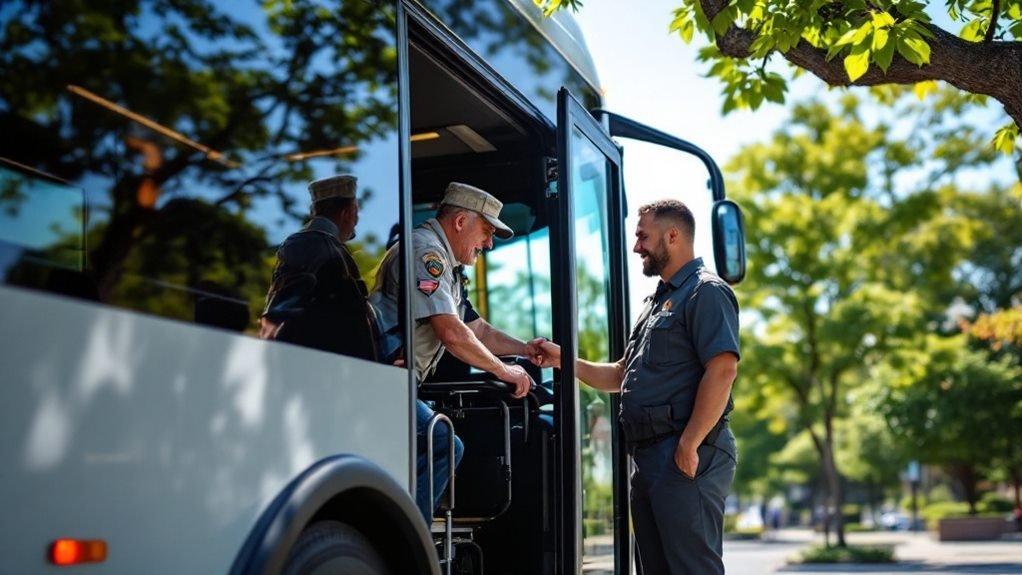Southwest Florida International Airport (RSW) stands as a critical nexus in the region's transportation infrastructure, operating continuously to accommodate the increasing demands of air travel. Despite its single runway, RSW adeptly manages peak periods, balancing efficiency with stringent safety standards. The airport's commitment to minimizing its environmental footprint is evident through its advanced noise monitoring and proactive community engagement. As regional growth persists, intriguing questions about how RSW will evolve to meet future challenges arise. What strategies and innovations will define its expansion and sustainability efforts? The answers may reshape the very fabric of regional air travel.
Key Takeaways
- Southwest Florida International Airport operates 24/7 under FAA regulations, ensuring safety and compliance.
- The airport employs noise management strategies, including Noise Overlay Zones and monitoring systems, to minimize community impact.
- Community engagement initiatives include the Aircraft Overflight Program and WebTrak Portal for transparency and feedback.
- Strategic infrastructural developments include terminal expansion, runway improvements, and sustainability projects.
- Future expansion plans include a parallel runway to enhance capacity and operational resilience.
Aircraft Operations Overview
Southwest Florida International Airport (RSW) operates continuously, maintaining a 24/7 schedule to accommodate various aircraft operations within the constraints defined by the Federal Aviation Administration (FAA).
The FAA oversees all movements in the National Airspace System, while the Lee County Port Authority (LCPA) does not regulate flight patterns. Operations align with FAA regulations, including 14 CFR 91.119, which mandates minimum altitudes of 1,000 feet over congested and 500 feet over non-congested areas.
Aircraft takeoff and landing directions are dictated by prevailing wind conditions to ensure safety. During reduced visibility, instrument approaches are essential, affecting operational patterns.
Peak travel occurs from early morning to mid-afternoon, optimizing service for travelers and promoting efficient aviation operations.
Noise Management Strategies
Effective noise management strategies at Southwest Florida International Airport (RSW) are crucial for minimizing the acoustic impact on surrounding communities. The airport employs data-driven approaches, including comprehensive Noise Studies compliant with FAA's 14 CFR Part 150 regulations, to evaluate and mitigate noise effects.
The 65 DNL contour analysis indicates limited residential exposure, guiding voluntary operational adjustments. RSW implements Noise Overlay Zones, strategically restricting noise-sensitive developments, thus safeguarding community tranquility.
The integration of advanced noise monitoring systems allows for precise tracking of acoustic footprints. Furthermore, the airport's adherence to operational modifications during varied weather conditions aids in noise abatement.
These strategies underscore RSW's commitment to balancing operational efficiency with community well-being, ensuring sound stewardship of shared spaces.
Community Engagement Initiatives
A multitude of initiatives underscore the Lee County Port Authority's (LCPA) commitment to community engagement, particularly in addressing aircraft noise concerns at Southwest Florida International Airport (RSW).
The LCPA actively leverages technological solutions and participatory platforms to ensure community feedback is integral to operational considerations. This data-driven approach includes:
- Aircraft Overflight Program: Enables real-time tracking and public feedback on noise disturbances.
- WebTrak Portal: Provides residents with access to flight data, enhancing transparency and understanding of aircraft operations.
- Community Noise Forums: Facilitates dialogue between stakeholders, fostering collaborative noise mitigation strategies.
- Public Comment Channels: Offers multiple pathways for residents to voice concerns, ensuring comprehensive coverage of community sentiment.
These initiatives reflect the LCPA's dedication to harmonizing airport operations with community well-being.
Residential Development Guidelines
When planning residential development in proximity to Southwest Florida International Airport (RSW), adherence to established zoning regulations and noise compatibility guidelines is paramount.
The Noise Overlay Zones, established under 14 CFR Part 150, delineate areas where noise-sensitive development is restricted. Developments within Zone B (60 DNL Noise Contour) are prohibited from including noise-sensitive uses.
In Zones C and D, developers must implement noise notification policies to ensure informed real estate decisions. Zoning processes are data-driven, utilizing the FAA's 65 DNL contour for compatibility assessments.
This ensures residential projects align with community needs and regulatory frameworks, fostering sustainable growth while maintaining quality of life. Engaging with these standards underscores a commitment to serving the broader community interests effectively.
Ongoing and Planned Developments
Anticipation surrounds the ongoing and planned developments at Southwest Florida International Airport (RSW), as the facility positions itself for future growth and enhanced operational capabilities.
The airport is focused on strategic infrastructural advancements to accommodate increasing passenger volumes and streamline operations. Key initiatives include:
- Terminal Expansion: Projects to increase capacity and enhance passenger processing efficiency.
- Runway Improvements: Upgrading existing surfaces to support larger aircraft and reduce turnaround times.
- Sustainability Projects: Implementing eco-friendly technologies to minimize environmental impact and operational costs.
- Parking Enhancements: Expanding parking facilities to improve accessibility and convenience for travelers.
These developments are driven by data analysis and industry benchmarks, ensuring that RSW not only meets current demands but also anticipates future needs, aligning with its commitment to serve the community effectively.
Flight Patterns and Airspace
Understanding the intricacies of flight patterns and airspace management at Southwest Florida International Airport (RSW) requires a comprehensive analysis of aeronautical data and regulatory frameworks.
The Federal Aviation Administration (FAA) regulates all aircraft operations within the National Airspace System, ensuring compliance with 14 CFR 91.119, which outlines minimum altitude requirements.
RSW operates continuously, with peak flight activities concentrated in morning and afternoon periods. Safety protocols dictate flight direction based on prevailing wind conditions, while reduced visibility necessitates instrument approaches.
The airport's single runway, 06/24, handles 80% of takeoffs to the northeast. Noise mitigation is guided by FAA's Part 150 program, with Noise Overlay Zones established to manage community impact, emphasizing the importance of serving local residents' needs effectively.
Future Airport Expansion Plans
In response to projected operational demands and economic growth, Southwest Florida International Airport (RSW) is planning a significant infrastructure expansion with the construction of a parallel runway south of the existing Runway 06/24.
This strategic development aims to enhance capacity, operational efficiency, and service quality for regional and international travelers.
Key elements of the expansion include:
- Capacity Augmentation: Address peak hour congestion and facilitate increased aircraft movements.
- Operational Resilience: Improve redundancy and flexibility in adverse weather conditions.
- Economic Stimulus: Foster regional economic growth by attracting new airline routes and services.
- Environmental Considerations: Incorporate sustainable practices and noise mitigation strategies.
These enhancements align with RSW's commitment to optimizing passenger experience and meeting the evolving needs of the aviation industry.
Conclusion
Southwest Florida International Airport (RSW) effectively manages aircraft operations through adherence to FAA regulations, advanced noise monitoring, and strategic community engagement, which collectively mitigate environmental and social impacts. Residential development guidelines and planned expansions aim to enhance capacity and efficiency, ensuring sustainable regional growth. Future developments are poised to optimize flight patterns and airspace utilization. This strategic approach ensures RSW remains a pivotal aviation hub, balancing operational demands with community and environmental considerations while supporting economic development in the region.



